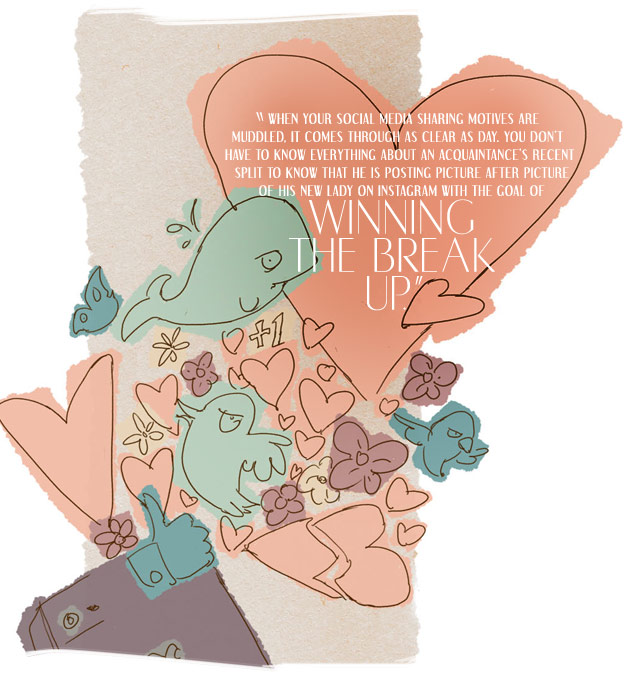As texting morphs language into a series of acronyms and nonsense words (see: “Bae” in the Urban Dictionary, the seemingly necessary shortening of “babe”), no abbreviation has ever been more timely. We are in the age of 140-characters-or-less, and letter reduction is critical to our ability to “share” as people.
And by share, I mean overshare.
Today, self-publishing online, whether it be accessible new media platforms or your own social network, has allowed for open discourse that has offered revitalization to topics—feminism for one—that often seemed rendered stagnant by mainstream media. In this way, too much information, or TMI, is not a bad thing, as it’s being used to force open conversation, shine a light on overlooked perspectives and recharge the energy around a fight worth having. Is this, though, how most of us apply TMI in our daily lives? Sadly, no. The bulk of us are too busy over-sharing our love lives.
We’ve all complained about it; the friend who can’t stop gushing all over our feeds about her new boyfriend, with her albums of photos that crop up weekly, if not daily. Every time it’s the same thing: two radiant faces pressed cheek to cheek…at the park, now at the farmers market, then at that new restaurant everyone’s trying to get a table at. Updates are tagged and locations are logged, as if their relationship has a reporting clause that requires an extended network of friends and family track their online return-on-investment. And, as such a clause would demand, we—the extended network—are privy to everything from private nicknames the couple have for one another (thanks to cutesy hashtags like “#brunchwithshmoops”) to the fact that these soulmates have already met each other’s parents, gone on a road trip, bought a kitten, and have the best time just hanging out doing laundry…because that’s what it’s like “when you’re in love with your best friend.” Essentially, for all intents and purposes, this pair invented falling in love and are #blessed. Right? Ummm, only if you believe every hashtag you read.
Now, I admit to initially being charmed by a friend who has suddenly become a carnival barker, spreading their joy to any and all who will buy it. In fact, I generally give everyone a brief hall pass at the beginning of a new relationship to be as completely gross online as they need to be in order to burn off all of the love endorphins. People who live in #bestboyfriendever glass houses, shouldn’t throw #shade stones after all.
Fleeting or not, relationship TMI—when it’s genuine—comes from the pure joy and excitement of enjoying time with someone you’ve discovered is the best person for you. And, in that context, who could judge a friend for being excited? No one.
This kind of genuine over-share, which generally mellows out as a relationship solidifies, is not the reason TMI gets such a bad rap. No, it’s the TMI that is clearly serving a bigger purpose that qualifies the sharer for some good old-fashioned side eye i.e. self-validating, self-important trumpeting of success that uses a relationship as just another trapping of the “good life.”
This particular type of TMI, whether rooted in insecurity, narcissism or a combination of the two, tends to come fragrant with a strong scent of desperation, and herein lies the bother…and motivation to throw the aforementioned #shade stones.
When your social media sharing motives are muddled, it comes through as clear as day. For example, you don’t have to know everything about an acquaintance’s recent split to know that he is posting picture after picture of his new lady on Instagram with the goal of “winning the break up.” By the tenth update on why being single is so much better than “boring, stagnant coupledom,” that single friend starts to look like they’re trying to convince themselves, far more than anyone else. And likewise, when a couple writes sappy notes on each other’s public feeds all the time, it just raises questions as to why they feel the need to share it all so publicly? Are they making up for fights? Could they be unfamiliar with the magic technology of texting, which would allow these intimate messages to stay private? One can’t help but ask: Why does this couple choose to put it all out there?
This is the real root of the question. Yes, our relationship status is intrinsically linked to our identity, along with our other passions, career and friendships. It’s an important part of the whole, and social media is designed to let us display as much or as little of that identity as we see fit. When we choose to put our relationships on display for public consumption, we are looking for gratification. We want everyone to “like” the status, “heart” the pic, and comment on how happy we seem, how good we look with our partner, how perfect we are together. Now that the tools are in place to get this feedback, who wouldn’t seek it?
The problem is that when the drive for public validation is more important than the relationship’s actual health, schadenfreude kicks in. If one’s relationship is akin to a marketing campaign—comprised of pretty pictures, buzzwords and hashtags—and the reality of coupledom doesn’t exactly match this image, the public pain is all the more potent.
Who among us can say that they’ve never seen an oversharer’s relationship status change on Facebook from “in a relationship with…” to “single” and not had one moment of mean-spirited smugness: “I knew they were compensating for something!” Erasing an entire relationship’s worth of content off your social media feeds is not easy, and for a couple that have kept it together with a publicly sunny onslaught of TMI as their IRL connection was lost, each photo to untag, post to delete and album to make invisible, exists as another painful stab of embarrassment.
So, what? Should we not post about our significant others at all? Absurd. I personally find the couples that studiously avoid mention of each other ever on social media as bizarre as celebrity couples who refuse to walk a red carpet together publicly, even though we all know they’re married. We exist and so does social media, there’s no way to turn back the clock. Fighting the urge to TMI, much like any other act of restraint, is all about balance.
Our love lives are not what define our entire identity; other interests, such as career, family, friends and our own selfish pursuits, should hold top billing too. It isn’t the sharing that’s obnoxious, it’s espousing the mantra of that old song “You’re Nobody till Somebody Loves You” that grates.
Ironically, the solution to relationship TMI is actually sharing more information; it just needs to have variety. Share more of that other stuff that make you who you are. In other words, share a full picture of your life. Love is beautiful, overwhelming and complicated, which is why it makes for such appealing subject matter. But loving your friends, your family, your job, your dog, and all the little obsessions that make you who you are is just as compelling. Spread the overshare around a bit, and give your private life just a little bit of its privacy back. If nothing else, keeping this balance will save you from losing virtual and real life friends the next time you can’t resist the urge to hashtag your affections. Remember: #Loveisreal and #Soistheunfollowbutton.

















